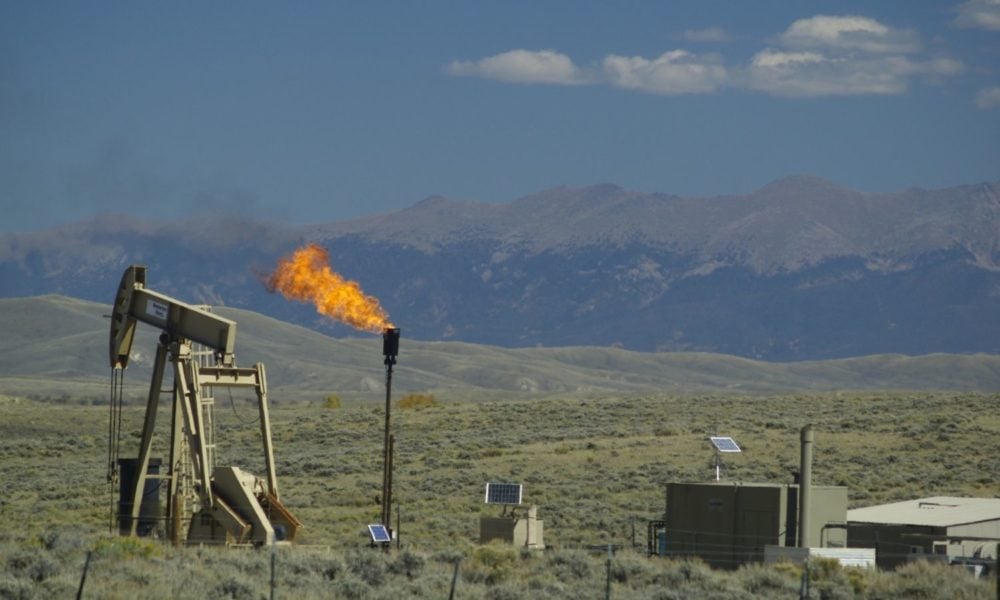The American Petroleum Institute? Blink once.
Touting its work with the Environmental Protection Agency? Blink twice.
On methane regulations? Scrunch, unscrunch.
Oh, this should be good.
For API, It’s All About Delay
Here’s where we’re at: Everybody knows—everybody everybody knows—that change is coming for the fossil fuel sector. Its present trajectory is careening us toward climate catastrophe. Something’s got to give.
The catch is, while change may be inevitable, the timeline for change is not. Which means that after a long and storied history of climate denial and climate deception, the American Petroleum Institute (API), the major oil and gas industry lobby, is now entirely about delay. Delay action, delay accountability, delay change. Everything, everything, everything: It’s all about delay.
This has disastrous implications for the climate—for as much as end goals dominate conversations, it’s cumulative emissions that are the problem—but as the inevitability of climate action closes in, delay is increasingly the only action-avoidance strategy API has left.
Unfortunately, that strategy is incredibly effective.
Because while the trade group now comfortably and confidently speaks about the seriousness of climate change and its commitment to future action, as long as it keeps finding ways to delay, we continue to pay while its corporate members keep cashing in on another day without action, another day without change.
Few things better illustrate the brazen cynicism of API’s delay tactics as its current actions in the face of mounting calls for rapidly curbing methane emissions.
Methane Emissions and Regulatory Inaction
Typically, we think of fossil fuels’ climate impact as coming from the carbon dioxide that’s released when they’re burned. But it turns out these combustion emissions capture only one part of the climate picture. That’s because methane, the primary component of natural gas, is also a heat-trapping pollutant, and a powerful one at that—when it’s released into the atmosphere, it’s more than 80 times more powerful than carbon dioxide over a 20-year period. Worse, it turns out that methane can be released from all types of fossil fuel infrastructure, from oil and gas wellheads to processing facilities, storage tanks, and pipeline networks.
Yet despite all this, methane emissions from oil and gas operations have remained largely unregulated.
Why’s that?
Delay.
First, when the Obama administration ramped up efforts for EPA methane rulemakings, API argued that the oil and gas sector shouldn’t be regulated because its performance had already improved dramatically over time.
But the agency’s entire motivation for establishing new regulations was because of how abysmally the industry was doing at that time, so that one didn’t stick.
Then API argued that methane emissions from oil and gas operations were too small to be concerned about.
That’s true if, and this is a big if, those emissions go uncounted. But once the data started coming in, it became increasingly clear that methane emissions from oil and gas operations are an enormous climate contributor. And the more we learn, the worse it gets. Limiting methane emissions from oil and gas operations would be a climate-trajectory game-changer.
Next, in a longtime industry favorite, API argued that controlling methane emissions from oil and gas operations would be too expensive.
In reality, staunching the flow of methane is achievable and affordable—commonly at the level of such basic things as swapping component parts, monitoring for leaks, and stopping venting and flaring.
So now having been rebuffed on the science and rebuffed on the economics—though successful on the delays that each debate entailed—API boldly tried on for size the philosophical argument that really, if you think about it just right, methane regulations shouldn’t even regulate methane.
Heavens above, that argument stuck.
Not because of science, of course, not because of economics, not because of law—not because of anything except for one single thing, which was that the Trump administration had entered office and it was right there plotting alongside API. Witness four years of regulatory rollbacks with methane standards foremost among them.
Then came January 20, 2021, and after all that delay, API was out with a new frame: Methane emissions do matter, the oil and gas industry is dedicated to responsible operations, and it fully supports putting methane standards in place.
Was this really the beginning of a new day?
No. No, never, no. It’s just API’s next attempt at delay.
And the same is true now, a half a year later, when API re-upped those stated commitments to EPA to counter the threat of new pressing forces for change.
Calling API’s Bluff
The last few months have seen motivation for methane action surge, accelerating what had already been an increasingly loud call for governments and businesses the world over to act.
Consider this:
- In late 2020, the French government paused a multibillion-dollar liquified natural gas contract with providers out of the Permian Basin due to concerns over methane emissions;
- On January 20, Day 1 in office, President Biden issued an executive order explicitly calling for EPA to revisit methane standards for oil and gas operations by September 2021;
- In April, a new methane-mapping satellite program was announced, joining other recently announced satellite projects in helping to enable transparency as to the true rate and source of methane pollution from oil and gas operators;
- In May, the UN Environment Programme released a report specifically focused on global methane emissions and the urgent need for methane action;
- In June, Congress employed the Congressional Review Act to revoke the Trump administration’s methane rollbacks and clear the course for the Biden EPA to act;
- In August, the UN Intergovernmental Panel on Climate Change (IPCC) released its first working group contribution to the Sixth Assessment Report, which included dedicated attention to the pressing methane problem;
- On September 15, the House Energy and Commerce Committee advanced bill text within the broader budget reconciliation process that would put a fee on methane pollution from oil and gas operators;
- On September 17, the United States and the European Union announced a commitment to significantly reduce methane emissions by the end of the decade; and
- Later this September, the EPA is expected to issue its first round of new methane standards for oil and gas.
And so it is that September finds API hollering to policymakers, to journalists, to anyone who will listen that it sincerely wants to work to control methane emissions, that really, it sincerely wants to work with the EPA: “Direct regulation of methane is the best method to implement,” it now says. “EPA is best-suited to address the challenges in reducing methane emissions.” “EPA is already statutorily required to set controls.” “The Biden administration is on track to regulate methane emissions and continue methane reduction progress” And more.
The trade group doth protest too much.
What’s really going on here, of course, is another desperate attempt at delay, and it’s the methane fee that has set API’s protestations fully ablaze.
EPA standards can, should, and must serve as the foundation of any methane regulation approach, but the methane fee now advancing through Congress can sit powerfully alongside, there, ready, in case industry actions fail to match industry words.
Because even though the fee is generally intended to be in line with where industry commitments have already landed, those targets are fixed to timelines, and the consequences are tied a fee. Which means suddenly, with a policy like this, there’d be no room left to delay, ending this unending catastrophe of delay.
And that’s why we now see API invoking the EPA.
API isn’t betting on the EPA for methane action’s sake. API is betting on the EPA because it sees it as offering one last chance to appear to be acting while tangling up the regulatory apparatus in some last bad-faith effort at delay. Whereas this methane fee? With that, the path is clear to forcing near-term change.
Congress Should See This Methane Fee Through
And here’s the thing: We need that near-term change.
Which means Congress needs to see this methane fee through.
There is no question that EPA standards are critical, fundamental, and essential to tackling the methane problem. No question. It is vital to get those standards in place.
But the methane fee can serve as a powerful complement, keeping industry in line. What’s more, should the fee kick in, revenues are intended to be in part cycled back into driving emissions reductions ever further, while also directly supporting communities that have borne the brunt of the health and environmental impacts of all this delay.
API is running scared.
Congress, let’s see that methane fee through.

